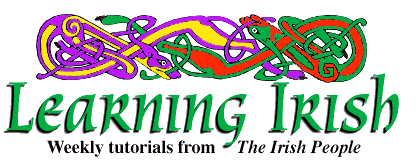
Irish Lesson 40
| PRONUNCIATION EXERCISE Read the phrases below out loud, referring to the pronunciation guide if necessary. When you can read the phrases readily, look at the translation and then go over the phrases again, visualizing the meaning as you say each. This week we will do heavy memorizing and drilling. The purpose is the thorough learning of aspiration, eclipsis, and some verb forms.
PRONUNCIATION EXERCISE Read the Irish phrases below out loud, referring to the pronunciation guide if necessary. When you can read the phrases readily, look at the translation and then go over the phrases again, visualizing the meaning as you say each: trí gheata; ceithre ghúna; sé mhéadar; dhá mhadra; cúig phingin; trí phaidir; dhá sheomra; ceithre sholas; sé thicéad; cúig thoitín naoi ngrian; acht nglas; deich míle; seacht mála; ocht bpíopa; deich bpunt; seacht seál; naoi sac; deich dteach; seacht dtobar (tree YAT-uh; KER-e GOON-uh; shay* VAY*-duhr; gaw* VWAH-druh; KOO-ig FEENG-in; tree FAHD-ir; gaw* HOHM-ruh; KER-e HUH-luhs; shay* hi-KAY*D; KOO-ig hi-TYEEN neeng REE-uhn; ohk*t nglahs; de MEEL-e; shahk*t MAW*-luh; ohk*t BEEP-uh; de boont; shahk*t shaw*l; nee sahk; de dyahk*; shak*t DOH-buhr) three gates; four dresses; six meters; two dogs; five cents; three prayers; two rooms; four lights; six tickets; five cigarettes nine suns; eight locks; ten thousand; seven bags; eight pipes; seven pounds; seven shawls; nine sacks; ten houses; seven wells
GRAMMAR You know several verbs of two syllables whose endings in some forms differ somewhat from the one-syllable verbs. "Ceannaigh" is an example: "ceannaíonn sé" (kan-EE-uhn shay*) means "he buys", and "cheannaíomar" (hyan-EE-uh-mar) means "we bought". Other verbs similar to "ceannaigh" are "imigh", "éirigh", and "deisigh". Many verbs ending in: ----il, ----in, ----ir and ----is are similar. They naturally drop out a syllable in some forms because the omission makes them easier to pronounce. Otherwise, they are very much like "ceannaigh". Learn the following examples, starting with oscail (OH-skil) open. Present: osclaím (OH-skleem), I open osclaíonn tú (oh-SKLEE-uhn too), you open osclaíonn sé, he opens osclaíonn sí, she opens osclaímid (oh-SKLEE-mid), we open osclaíonn sibh (shiv) you (pl) open osclaíonn siad (SHEE-uhd), they open
Ní osclaím, ní osclaíonn tú, ní osclaímid, etc. An osclaím? An osclaíonn tú? an osclaímid? etc. Nach n-osclaím (nahk* NOH-skleem), nach n-osclaíonn tú? etc.
Past: d'oscail mé (DOH-skil may*), I opened d'oscail tú, you opened d'oscail sé, he opened d'oscail sí, she opened d'osclaíomar (doh-SKLEE-uh-kuhr), we opened d/oscail sibh, you (pl) opened d'oscail siad, they opened
Níor oscail mé, níor oscail tú, níor osclaíomar (NEE-uhr oh-SKLEE-uh--muhr) etc. Ar oscail mé? ar oscail tú? ar osclaíomar? etc Nár oscail mé? nár oscail tú? nár osclaíomar? etc. cosain (KUH-sin) defend
Present: Cosnaím (KUHS-neem), cosnaíonn tú (kuhs-NEE-uhn-too), cosnaímid (kuhs-NEE-mid), cosnaíonn sibh, etc Ní chosnaím (nee K*UHS-neem), ní chosnaíonn tú, ní chosnaímid (nee k*uhs-NEE-mid) etc. An gcosnaim? etc. Nach gcosnaim? etc.
Past: Chosain mé (K*UH-sin may*) I defend, etc. Chosnaíomar (k*uhs- NEE-uh-muhr), we defend, etc. Níor chosain mé, níor chosain tú, níor chosnaíomar, etc. Ar chosain mé? ar chosnaíomar? (er k*uhs-NEE-uh-muhr) etc. Nár chosain mé? nár chosnaíomar? etc.
Labhair (LOU-ir), speak, becomes "labhraíonn sé" (lou-REE-uhn shay*), he speaks, "labhraíomar" (lou-REE-uh-muhr) we spoke. The basic form of this verb is "labhair", of course, and "labhair sé" means "he spoke". Inis (IN-ish), tell, becomes "insíonn sé" (in-SHEE-uhn shay*), he tells, and "d'insíomar" (din-SHEE-uh-muhr), we told. The basic form of the verb is "inis", and "d'inis sé" means "he told".
For "oscail, cosain, labhair" and "inis," note the loss of the syllable in pronouncing forms with added suffixes, such as oscail, osclaíonn.
DRILL Go through the present and past tenses of these verbs: imigh (IM-ee), depart; tochail (TOHK*-il), dig; cogain (KUHG-in), chew; bagair (BAHG-ir), threaten. For example: Imím, imíonn tú etc. Ní imím, ní imíonn tú etc. An imím? etc. Nach n-imím? etc. D'imigh mé, etc. Níor imigh mé, etc. Ar imigh mé?, etc. Nár imigh mé?, etc. The key forms are: Imíonn, d'imíomar. Tochlaíonn, thochlaíomar. Cognaionn, chognaíomar. Bagraíonn, bhagraíomar.
(c) 1997 The Irish People. May be reprinted with credit. |